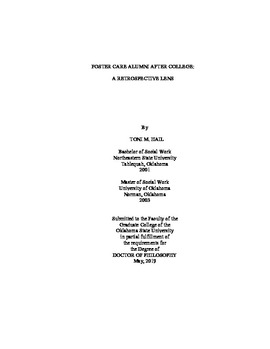| dc.contributor.advisor | Kearney, Kerri | |
| dc.contributor.author | Hail, Toni M. | |
| dc.date.accessioned | 2019-10-25T19:51:38Z | |
| dc.date.available | 2019-10-25T19:51:38Z | |
| dc.date.issued | 2019-05-01 | |
| dc.identifier.uri | https://hdl.handle.net/11244/321557 | |
| dc.description.abstract | Completing a college degree is major accomplishment under the best of circumstances. The economic and societal value of a college degree has the potential to produce residual benefits for one of the most vulnerable populations, foster care alumni. A specific group of foster care alumni, those who "age out" of foster care share the same aspirations to complete college as their non-foster care peers; however, there is an obvious discrepancy in actual outcomes between the two groups in terms of completing their degrees. (Davis, 2007). Consequently, the focus of this research was to gain insight and knowledge about what circumstances and/or conditions were present for the small percent of foster care alumni that persisted and completed a bachelor's degree in Oklahoma. | |
| dc.description.abstract | This multi-case study consisted of 9 participants with unique individual experiences and shared commonalities in terms of what helped them to persist and complete college and also how they sought and accepted support in times of need. The participants represented 5 different public colleges in Oklahoma. Collectively, four findings emerged from the data. Participants credited support from others as significant in their abilities to persist in college, their rationale for seeking a college degree was a significant source of motivation as they wanted to experience a better life in adulthood than they experienced in childhood. The majority of participants chose degrees that would allow them to work in a helping profession and contribute to improving the lives of others in situations similar to what they experienced in childhood. Interestingly, their goal of helping and supporting others somewhat contradicted the way they accessed support from others. Participants exercised caution and were often times reluctant to seek/accept support from others. The findings from this research indicates that foster care alumni, although considered one of the most academically vulnerable groups (Zetlin & Weinberg, 2010), were able to persist and complete a bachelor's degree as a result of genuine, authentic, support networks and an innate desire to have a better quality life and help others in a professional capacity. | |
| dc.format | application/pdf | |
| dc.language | en_US | |
| dc.rights | Copyright is held by the author who has granted the Oklahoma State University Library the non-exclusive right to share this material in its institutional repository. Contact Digital Library Services at lib-dls@okstate.edu or 405-744-9161 for the permission policy on the use, reproduction or distribution of this material. | |
| dc.title | Foster Care Alumni After College: A Retrospective Lens | |
| dc.contributor.committeeMember | Moore, Tami L. | |
| dc.contributor.committeeMember | Wanger, Stephen P. | |
| dc.contributor.committeeMember | Welch, Ginger | |
| osu.filename | Hail_okstate_0664D_16093.pdf | |
| osu.accesstype | Open Access | |
| dc.type.genre | Dissertation | |
| dc.type.material | Text | |
| dc.subject.keywords | alumni | |
| dc.subject.keywords | bachelor's | |
| dc.subject.keywords | degree | |
| dc.subject.keywords | educational | |
| dc.subject.keywords | foster | |
| dc.subject.keywords | outcomes | |
| thesis.degree.discipline | Educational Leadership and Policy Studies | |
| thesis.degree.grantor | Oklahoma State University | |
